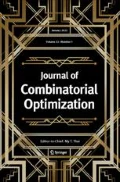Abstract
Social exchange networks model the behavior of a set of players who need to reach pairwise agreements for making profits. The fundamental problem in exchange networks is how to find the equilibrium such that every participant has no better choices. To resolve this problem, a stable “outcome” which consists of a set of transactions and gains of players in these transactions must be found. In this paper, we first propose the general model of stable outcome applying to arbitrary social graphs, and then present the minimum stability problem (MinSTBL), which is to find the stable outcome the total weight of whose transactions is the minimum. MinSTBL can be employed by governments and companies to stimulate economic participation with the lowest cost. For graphs with unit edge weights, we give an almost optimal solution. For graphs with general edge weights, we prove that the maximum-weight matching is optimal if the graph is bipartite, and propose a relaxed solution that uses at most twice of the optimal cost for regular graphs that are not necessarily bipartite. Our algorithms have been tested on real world social networks and artificial networks, and their effectiveness is evaluated.








Similar content being viewed by others
References
Anshelevich E, Hoefer M (2010) Contribution games in social networks. In: de Berg M, Meyer U (eds) Algorithms C ESA 2010e, vol 6346. Lecture notes in computer scienc. Springer, Berlin, pp 158–169
Anshelevich E, Hoefer M (2012) Contribution games in networks. Algorithmica 63(1–2):51–90
Anshelevich E, Bhardwaj O, Hoefer M, (2013) Friendship and stable matching. In: Bodlaender HL, Italiano GF (eds) Algorithms-ESA 2013. Lecture notes in computer science, vol 8125. Springer, Berlin, Heidelberg, pp 49–60
Aspvall B, Shiloach Y (1980) A polynomial time algorithm for solving systems of linear inequalities with two variables per inequality. SIAM J Comput 9(4):827–845
Bayati M, Borgs C, Chayes J, Kanoria Y, Montanari A (2015) Bargaining dynamics in exchange networks. J Econ Theory 156:417–454
Blocq G, Orda A (2016) How good is bargained routing? IEEE/ACM Trans Netw 24(6):3493–3507
Bock A, Chandrasekaran K, Könemann J, Peis B, Sanità L (2015) Finding small stabilizers for unstable graphs. Math Program 154(1):173–196
Celis L, Devanur N, Peres Y (2010) Local dynamics in bargaining networks via random-turn games. In: Saberi A (ed) Internet and network economics, vol 6484. Lecture notes in computer science. Springer, Berlin, pp 133–144
Coviello L, Franceschetti M (2012) Distributed team formation in multi-agent systems: stability and approximation. In: 2012 IEEE 51st annual conference on decision and control (CDC), pp 2755–2760
Edmonds J (1965) Paths, trees, and flowers. Can J Math 17:449–467
Galil Z (1986) Efficient algorithms for finding maximum matching in graphs. ACM Comput Surv 18(1):23–38. https://doi.org/10.1145/6462.6502
Georgioua K, Karakostasb G, Konemanna J, Stamirowskac Z (2014) Social exchange networks with distant bargaining. Theor Comput Sci 554:263–274
Ghosh A, Kale S, Lang K, Moseley B (2013) Bargaining for revenue shares on tree trading networks. In: Proceedings of the twenty-third international joint conference on artificial intelligence. IJCAI ’13, AAAI Press, pp 129–135
Ito T, Kakimura N, Kamiyama N, Kobayashi Y, Okamoto Y (2017) Efficient stabilization of cooperative matching games. Theor Comput Sci 677:69–82
Kanoria Y, Bayati M, Borgs C, Chayes JT, Montanari A (2009) A natural dynamics for bargaining on exchange networks. arXiV:abs/0911.1767
Kanoria Y, Bayati M, Borgs C, Chayes J, Montanari A (2011) Fast convergence of natural bargaining dynamics in exchange networks. In: Proceedings of the twenty-second annual ACM-SIAM symposium on discrete algorithms. SODA ’11, SIAM, pp 1518–1537
Kleinberg J, Tardos E (2008) Balanced outcomes in social exchange networks. In: The 40th ACM symposium on theory of computing (STOC 2008). ACM
Leskovec J, Kleinberg J, Faloutsos C (2007) Graph evolution: densification and shrinking diameters. ACM Trans Knowl Discov Data: ACM TKDD 1(1):2
Leskovec J, Huttenlocher D, Kleinberg J (2010) Predicting positive and negative links in online social networks. In: Proceedings of the 19th international conference on World Wide Web. WWW ’10, pp 641–650
Ma H, Lu Z, Li D, Zhu Y, Fan L, Wu W (2014) Mining hidden links in social networks to achieve equilibrium. Theor Comput Sci 556:13–24
Molm LD (2001) Theories of social exchange and exchange networks. In: Ritzer G, Smart B (eds) Handbook of social theory. SAGE Publications Ltd., New York, pp 260–272
Nash J (1950) The bargaining problem. Econometrica 18:155–162
Osborne MJ (2003) An introduction to game theory. Oxford University Press, Oxford
Schrijver A (2003) Combinatorial optimization polyhedra and efficiency. Springer, Berlin
Willer D (1999) Network exchange theory. Praeger, Santa Barbara
Acknowledgements
This research was supported in part by the National Natural Science Foundation of China under Grant 11671400.
Author information
Authors and Affiliations
Corresponding author
Additional information
Publisher's Note
Springer Nature remains neutral with regard to jurisdictional claims in published maps and institutional affiliations.
Rights and permissions
About this article
Cite this article
Zhu, Y., Yan, R. & Li, D. Minimum cost stability in exchange networks. J Comb Optim 38, 987–1004 (2019). https://doi.org/10.1007/s10878-019-00431-z
Published:
Issue Date:
DOI: https://doi.org/10.1007/s10878-019-00431-z




